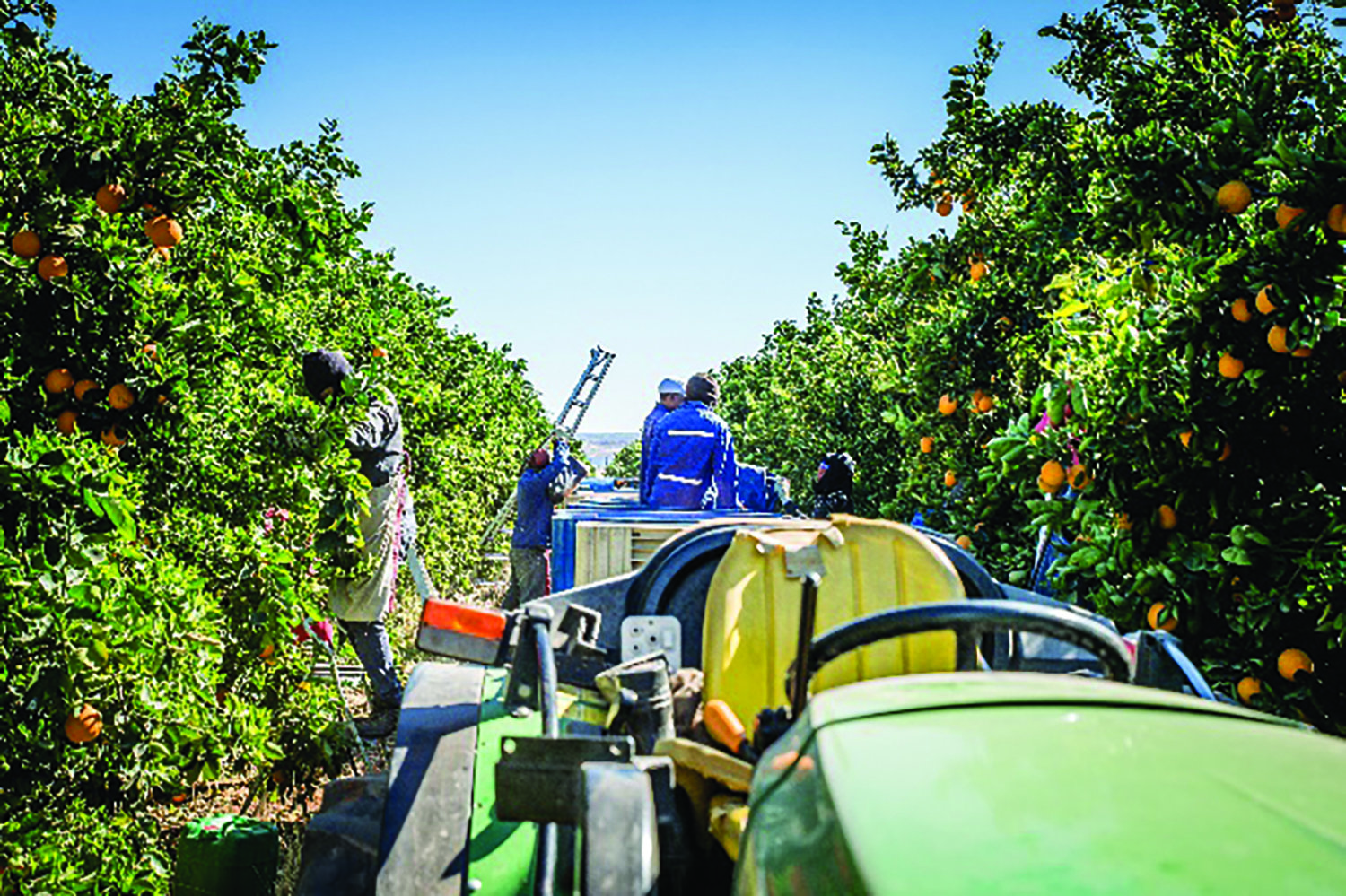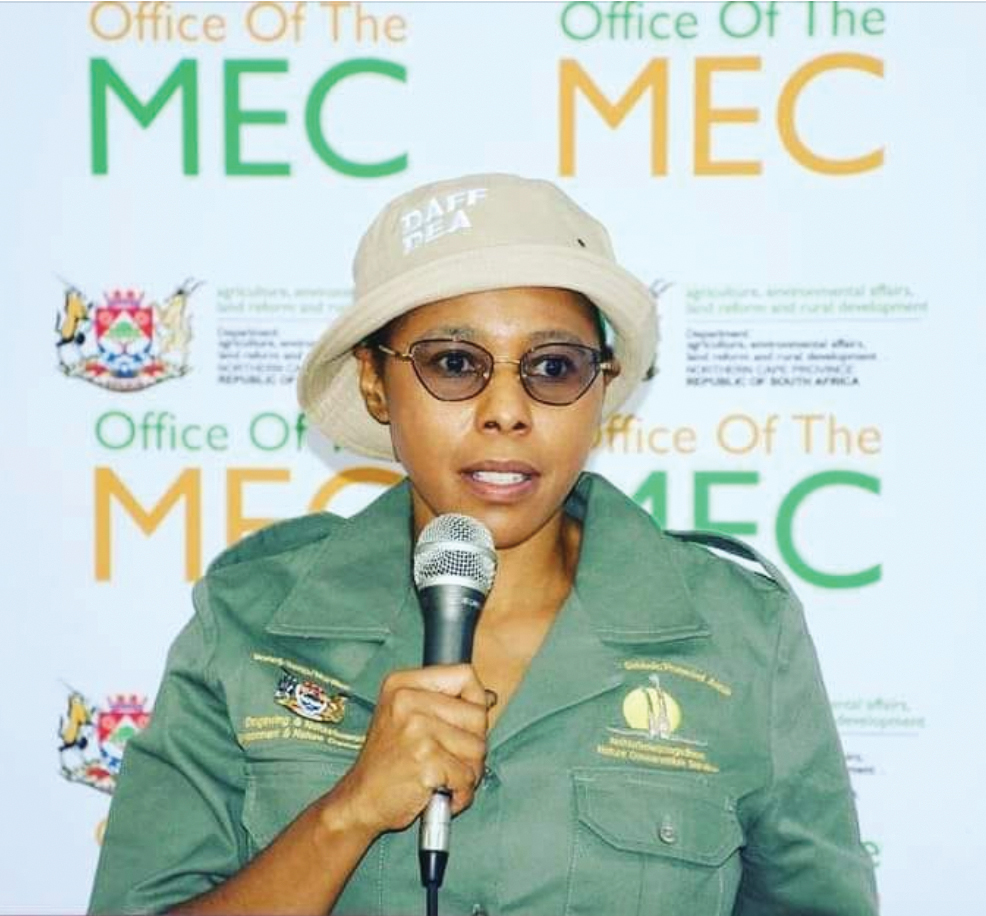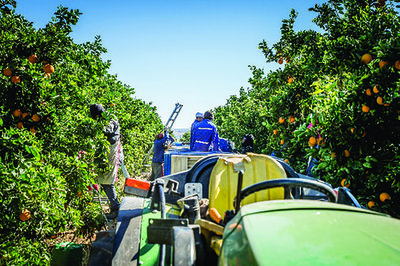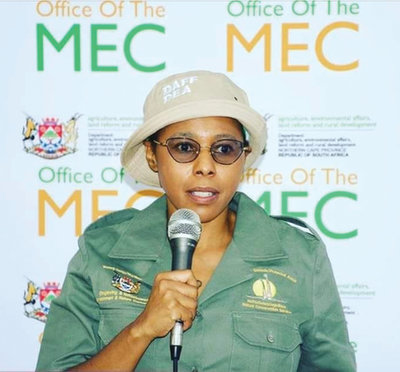Northern Cape Business 2023/24

Agriculture
Climate change is presenting new challenges.


Mosplaas Citrus at Keimoes on the Orange River produces early-season fruit for the Karsten Group. Credit: The Karsten Group.

Northern Cape MEC of Agriculture, Environmental Affairs, Rural Development and Land Reform, Mase Manopole, has vowed to help farmers and farmworkers.
After many years of drought, Northern Cape farmers have been battered by floods.
For livestock farmers whose infrastructure has not been destroyed by overflowing rivers, the rain at least has the effect of reviving the veld to the point where sheep can graze again.
Farmers dependent on irrigation, of whom there are many in the Vaalharts region and along the banks of the Orange River, face the additional uncertainty of the supply of electricity being unreliable as Eskom struggles to keep its power stations functioning optimally. And then the locusts swarmed, a regular occurrence.
The fact that charities have been created with names such as “Save a Farm” and “Save the Sheep” is indicative of tough times. Both provincial and national government have reacted to the severity of the situation.
The Northern Cape MEC of Agriculture, Environmental Affairs, Rural Development and Land Reform, Mase Manopole, told the website Food For Mzansi that she was working around the clock together with the provincial government to ensure that the province remains food secure. Farmers’ concerns on a range of issues would be addressed.

Upington Industrial Park will be a services centre for the sector.
The MEC has met with farmers and representatives of Eskom to find ways to mitigate the power supply issue. A task team has been established by the National Department of Agriculture, Land Reform and Rural Development (DALRD), where four sub-committees will report to the minister.
In response to the death of several farm workers from what appeared to be heatstroke in January 2023, another national minister, the Minister of Employment and Labour Thulas Nxesi, joined the MEC on a tour of three farms in the Kakamas area. He warned that food security would be affected if the preservation of the livelihood of farmworkers was not prioritised.
The Provincial Government of the Northern Cape has announced that the Upington Industrial Park will act as a services centre for road, rail and air transport, agriculture, agro-processing and manufacturing.
In a similar vein, the Namakwa SEZ in Aggeneys will become an industrial cluster for mining and agriculture services, beneficiation and manufacturing.
Farmers and agro-processors are increasingly drawing attention to the need for good roads for the delivery of their products to market and they will be hoping that these parks will help to provide the necessary infrastructure.
Premier Dr Zamani Saul referenced all of these problems in his 2023 State of the Province Address but added sinkholes and severe fires to the list. As he said in his speech, “The effects of climate change have been felt very close to home.”
Dr Saul went on to list dealing with the effects of climate change as one of the priorities of the provincial administration for the 2023/24 period. In attempting to improve food security, the provincial government has pledged to help recipients of farms in terms of the land reform process to increase production and to supply technical and advisory services. Subsistence farmers receive garden starter packs and equipment.
The Unemployed Agriculture Graduate Programme places candidates in a commercial business for a two-year period. The next intake will be in 2023/24 when about 80 graduates will be placed.
Agricultural assets
Occupying 36-million hectares, the Northern Cape is the largest province in the country, almost a third of South Africa’s total land area. Although the province is a predominantly semi-arid region, agriculture is a major component of the regional economy and the province’s farmers contribute 6.8% to South African agriculture.
The agricultural sector also plays a vital role in the broader economy of the Northern Cape, employing about 45 000 people. This represents about 16% of employment, a much higher figure than the national figure of 5.5%
Agricultural development takes place along defined corridors within the province. In the Orange River Valley, especially at Upington, Kakamas and Keimoes, grapes and fruit are cultivated intensively.
High-value horticultural products such as table grapes, sultanas and wine grapes, dates, nuts, cotton, fodder and cereal crops are grown along the Orange River. Wheat, fruit, groundnuts, maize and cotton are grown in the Vaalharts Irrigation Scheme in the vicinity of Hartswater and Jan Kempdorp. The Vaalharts Irrigation Scheme is one of the biggest systems of its kind in the world. Ranging over more than 30 000ha, it has transformed a semi-desert zone into a productive area that sustains cotton, wheat, maize, lucerne, citrus, peanuts, fruit, grapes, olives and pecan nuts.
Vegetables and cereal crops are farmed at the confluence of the Vaal River and the Orange River in the vicinity of Douglas.
Of the nearly 40-million 10kg bags of onions produced in South Africa (outside of linked production chains set up by supermarkets), about 10-million 10kg bags come from the Northern Cape.
Wool, mohair, karakul, Karoo lamb, venison, ostrich meat and leather are farmed throughout most of the province. The province is second only to the Eastern Cape in terms of the number of sheep farmed and it is the fourth-largest wool-producing province based on annual sale of producer lots. The Beefmaster abattoir in Kimberley is one of three abattoirs in South Africa to export frozen beef to China. The company processes and packages about 30 000 tons at the abattoir.
Niche markets
Rooibos has not yet made a big dent in the 200 000 tons of tea consumed by Japan every year, but sales are growing steadily. Introducing a new variety to a country of tea aficionados is easier than tackling a nation of coffee drinkers. A total of 2 000 tons was shipped to Japan from South Africa in 2018.
Rooibos is competing in the “Healthy Tea” segment and a popular restaurant chain’s decision to use the tea as a complement to its pork bone broth has helped to promote the product. Brazil is being explored as a potential market.
About 6 000 tons of tea is exported to more than 30 countries and domestic consumption is about 8 000 tons. The South African Rooibos Council states that more than 5 000 people are employed in the rooibos industry.
Another niche product of the Northern Cape is karakul pelt, which is a speciality of the Gordonia district of Upington. Agri-company KLK is the only organisation that handles these pelts in South Africa. Glove-makers in Milan are among the international clients to whom farmers of the dorper sheep breed sell the wrinkle-free skins of their sheep, at good prices. Horse stud breeding provides yet another exclusive niche. This is a speciality of the area around Colesberg, where the cold evenings and warm days combine to drive out disease and promote strong growth.
Companies
KLK is based in Upington and does much more than karakul pelts. The company’s interests include 19 retail outlets, 12 petrol stations, four Build it franchises and a strong auction division.
KLK runs three abattoirs in Calvinia, Carnarvon and Upington that slaughter lamb and beef carcasses. SA Dorper manages the production and export of dorper skins and the production of cattle hides.
GWK is another company with its headquarters in the Northern Cape, in this case the town of Douglas. Senwes is one of the country’s biggest agri-companies and its Northern Cape area of operation is mostly around the Vaalharts irrigation area, which is close to the headquarters just over the provincial border in North West, at Klerksdorp. Storage and handling of grains and oilseeds are the speciality of Senwes.
OVK controls the large Gariep abattoir at Strydenburg, which has a daily capacity of 1 300 sheep, 100 cattle and either 250 ostriches or 750 small game animals. OVK also has trade branches, vehicle dealerships, a finance division and manufacturing facilities for maize meal and wheat meal.
Kaap Agri, a Western Cape company, has a significant presence in the Northern Cape and Namibia.

Agricultural Research Council: www.arc.agric.za
Red Meat Producers Organisation: www.rpo.co.za
South African Pecan Nut Producers Association: www.sappa.za.org
South African Rooibos Council: www.sarooibos.co.za

Northern Cape Business 2023/24

Agriculture
Climate change is presenting new challenges.


Mosplaas Citrus at Keimoes on the Orange River produces early-season fruit for the Karsten Group. Credit: The Karsten Group.
After many years of drought, Northern Cape farmers have been battered by floods.
For livestock farmers whose infrastructure has not been destroyed by overflowing rivers, the rain at least has the effect of reviving the veld to the point where sheep can graze again.
Farmers dependent on irrigation, of whom there are many in the Vaalharts region and along the banks of the Orange River, face the additional uncertainty of the supply of electricity being unreliable as Eskom struggles to keep its power stations functioning optimally. And then the locusts swarmed, a regular occurrence.
The fact that charities have been created with names such as “Save a Farm” and “Save the Sheep” is indicative of tough times. Both provincial and national government have reacted to the severity of the situation.

Northern Cape MEC of Agriculture, Environmental Affairs, Rural Development and Land Reform, Mase Manopole, has vowed to help farmers and farmworkers.
The Northern Cape MEC of Agriculture, Environmental Affairs, Rural Development and Land Reform, Mase Manopole, told the website Food For Mzansi that she was working around the clock together with the provincial government to ensure that the province remains food secure. Farmers’ concerns on a range of issues would be addressed.

Upington Industrial Park will be a services centre for the sector.
The MEC has met with farmers and representatives of Eskom to find ways to mitigate the power supply issue. A task team has been established by the National Department of Agriculture, Land Reform and Rural Development (DALRD), where four sub-committees will report to the minister.
In response to the death of several farm workers from what appeared to be heatstroke in January 2023, another national minister, the Minister of Employment and Labour Thulas Nxesi, joined the MEC on a tour of three farms in the Kakamas area. He warned that food security would be affected if the preservation of the livelihood of farmworkers was not prioritised.
The Provincial Government of the Northern Cape has announced that the Upington Industrial Park will act as a services centre for road, rail and air transport, agriculture, agro-processing and manufacturing.
In a similar vein, the Namakwa SEZ in Aggeneys will become an industrial cluster for mining and agriculture services, beneficiation and manufacturing.
Farmers and agro-processors are increasingly drawing attention to the need for good roads for the delivery of their products to market and they will be hoping that these parks will help to provide the necessary infrastructure.
Premier Dr Zamani Saul referenced all of these problems in his 2023 State of the Province Address but added sinkholes and severe fires to the list. As he said in his speech, “The effects of climate change have been felt very close to home.”
Dr Saul went on to list dealing with the effects of climate change as one of the priorities of the provincial administration for the 2023/24 period. In attempting to improve food security, the provincial government has pledged to help recipients of farms in terms of the land reform process to increase production and to supply technical and advisory services. Subsistence farmers receive garden starter packs and equipment.
The Unemployed Agriculture Graduate Programme places candidates in a commercial business for a two-year period. The next intake will be in 2023/24 when about 80 graduates will be placed.
Agricultural assets
Occupying 36-million hectares, the Northern Cape is the largest province in the country, almost a third of South Africa’s total land area. Although the province is a predominantly semi-arid region, agriculture is a major component of the regional economy and the province’s farmers contribute 6.8% to South African agriculture.
The agricultural sector also plays a vital role in the broader economy of the Northern Cape, employing about 45 000 people. This represents about 16% of employment, a much higher figure than the national figure of 5.5%
Agricultural development takes place along defined corridors within the province. In the Orange River Valley, especially at Upington, Kakamas and Keimoes, grapes and fruit are cultivated intensively.
High-value horticultural products such as table grapes, sultanas and wine grapes, dates, nuts, cotton, fodder and cereal crops are grown along the Orange River. Wheat, fruit, groundnuts, maize and cotton are grown in the Vaalharts Irrigation Scheme in the vicinity of Hartswater and Jan Kempdorp. The Vaalharts Irrigation Scheme is one of the biggest systems of its kind in the world. Ranging over more than 30 000ha, it has transformed a semi-desert zone into a productive area that sustains cotton, wheat, maize, lucerne, citrus, peanuts, fruit, grapes, olives and pecan nuts.
Vegetables and cereal crops are farmed at the confluence of the Vaal River and the Orange River in the vicinity of Douglas.
Of the nearly 40-million 10kg bags of onions produced in South Africa (outside of linked production chains set up by supermarkets), about 10-million 10kg bags come from the Northern Cape.
Wool, mohair, karakul, Karoo lamb, venison, ostrich meat and leather are farmed throughout most of the province. The province is second only to the Eastern Cape in terms of the number of sheep farmed and it is the fourth-largest wool-producing province based on annual sale of producer lots. The Beefmaster abattoir in Kimberley is one of three abattoirs in South Africa to export frozen beef to China. The company processes and packages about 30 000 tons at the abattoir.
Niche markets
Rooibos has not yet made a big dent in the 200 000 tons of tea consumed by Japan every year, but sales are growing steadily. Introducing a new variety to a country of tea aficionados is easier than tackling a nation of coffee drinkers. A total of 2 000 tons was shipped to Japan from South Africa in 2018.
Rooibos is competing in the “Healthy Tea” segment and a popular restaurant chain’s decision to use the tea as a complement to its pork bone broth has helped to promote the product. Brazil is being explored as a potential market.
About 6 000 tons of tea is exported to more than 30 countries and domestic consumption is about 8 000 tons. The South African Rooibos Council states that more than 5 000 people are employed in the rooibos industry.
Another niche product of the Northern Cape is karakul pelt, which is a speciality of the Gordonia district of Upington. Agri-company KLK is the only organisation that handles these pelts in South Africa. Glove-makers in Milan are among the international clients to whom farmers of the dorper sheep breed sell the wrinkle-free skins of their sheep, at good prices. Horse stud breeding provides yet another exclusive niche. This is a speciality of the area around Colesberg, where the cold evenings and warm days combine to drive out disease and promote strong growth.
Companies
KLK is based in Upington and does much more than karakul pelts. The company’s interests include 19 retail outlets, 12 petrol stations, four Build it franchises and a strong auction division.
KLK runs three abattoirs in Calvinia, Carnarvon and Upington that slaughter lamb and beef carcasses. SA Dorper manages the production and export of dorper skins and the production of cattle hides.
GWK is another company with its headquarters in the Northern Cape, in this case the town of Douglas. Senwes is one of the country’s biggest agri-companies and its Northern Cape area of operation is mostly around the Vaalharts irrigation area, which is close to the headquarters just over the provincial border in North West, at Klerksdorp. Storage and handling of grains and oilseeds are the speciality of Senwes.
OVK controls the large Gariep abattoir at Strydenburg, which has a daily capacity of 1 300 sheep, 100 cattle and either 250 ostriches or 750 small game animals. OVK also has trade branches, vehicle dealerships, a finance division and manufacturing facilities for maize meal and wheat meal.
Kaap Agri, a Western Cape company, has a significant presence in the Northern Cape and Namibia.

Agricultural Research Council: www.arc.agric.za
Red Meat Producers Organisation: www.rpo.co.za
South African Pecan Nut Producers Association: www.sappa.za.org
South African Rooibos Council: www.sarooibos.co.za
